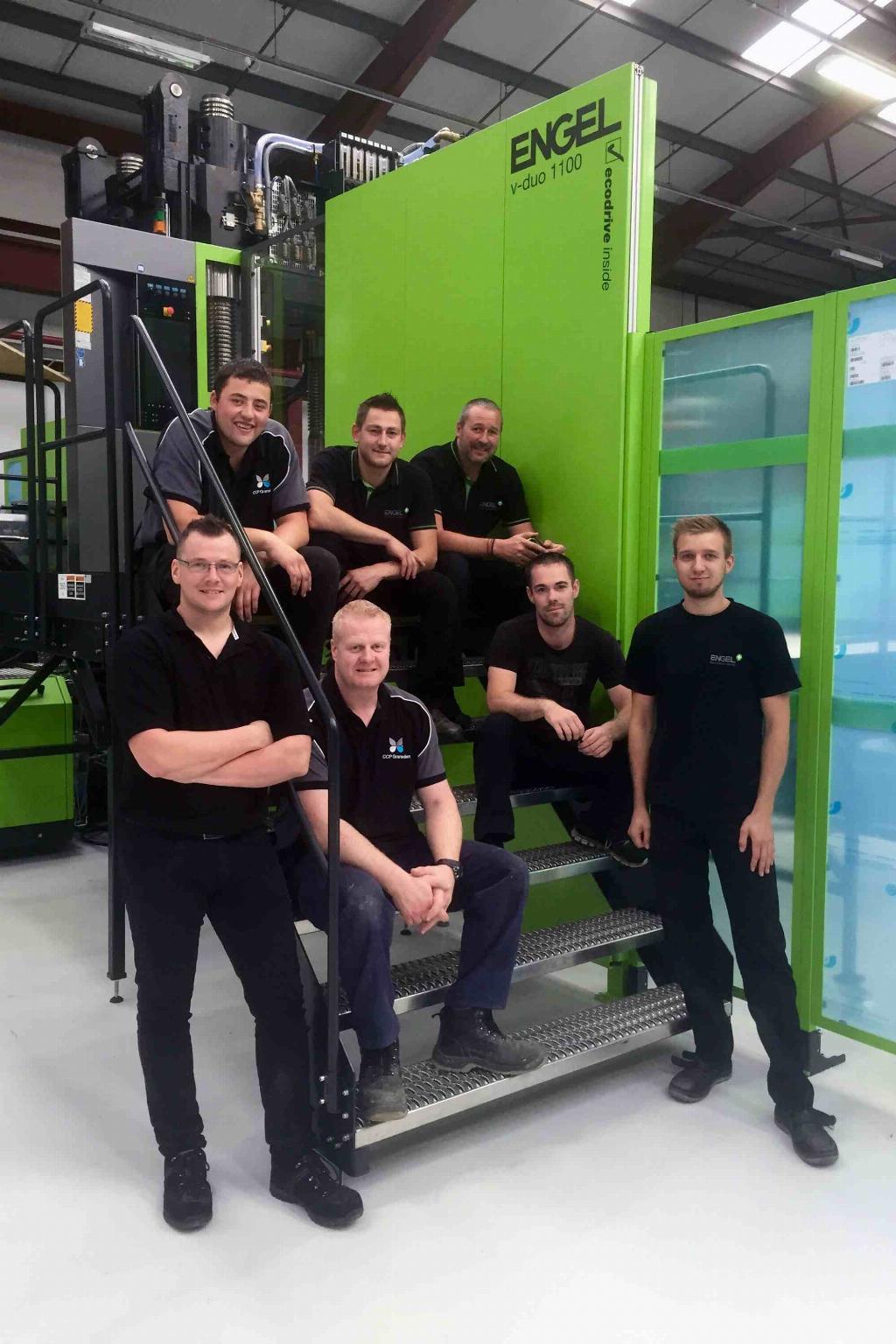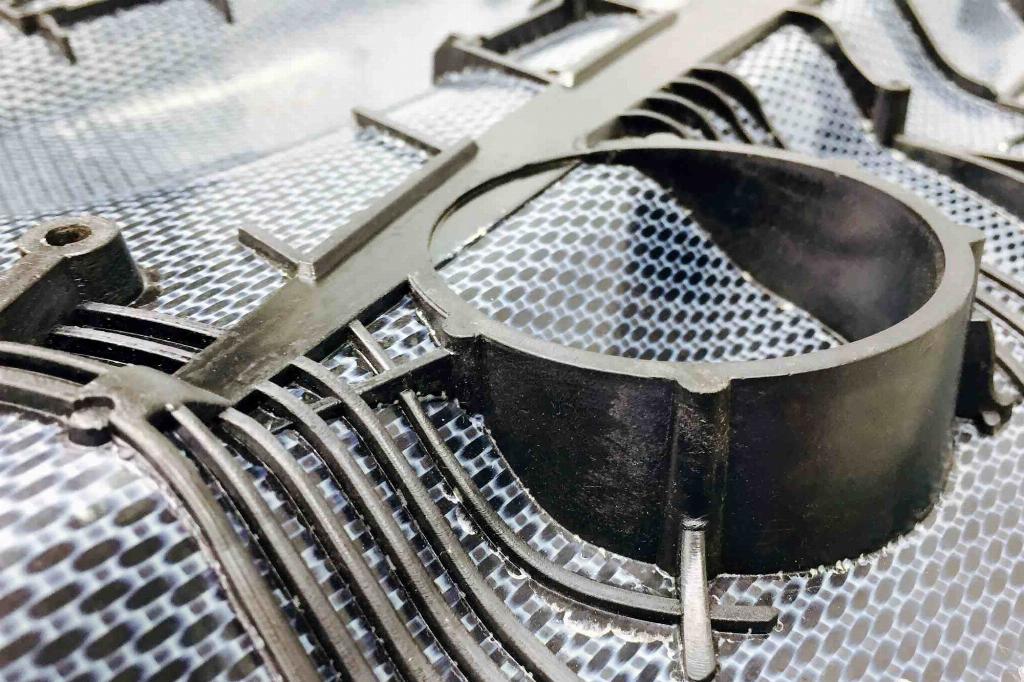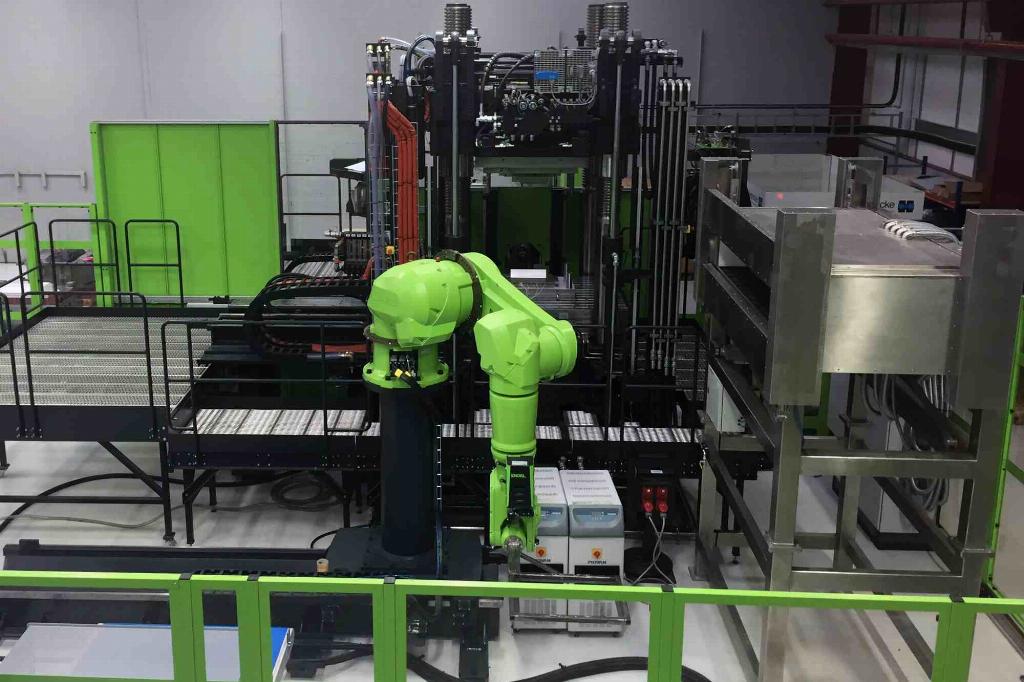Be the first!

Composites in Manufacturing hears how CCP Gransden is driving forward thermoplastic-based lightweight construction with the help of ENGEL’s v-duo press.
Increasing the performance and cost-effectiveness of high-tech lightweight construction components with the help of composite technologies is a daily challenge for CCP Gransden.
A family run business for 125 years, the company based in Ballygowan, near Belfast in Northern Ireland, has established an impressive market position as a partner for the development and production of composite components. In order to secure its pole position in the trending topic of thermoplastic composites, CCP invested in a v-duo press by ENGEL.
Composite solutions on a consistently thermoplastic material basis allow for especially efficient, integrated production processes and the subsequent recycling of disused parts.

These are the reasons why there is an increasing focus on thermoplastic materials for lightweight construction in the context of high volumes. The principal driver is the automotive industry, but aircraft manufacturers are also increasingly requesting thermoplastic solutions from CCP Gransden.
"The structure and the interior of an aircraft also includes components that are needed in large quantities," explains Peter Quigley, engineering manager of CCP Gransden. "We adapt processes developed for the automotive industry to aircraft manufacturing. The exciting thing is that we often bring back the optimised processes into the automotive industry – thus also increasing efficiency and performance there.”
A clear focus on innovation, customer-specific solutions and continuous investment are the factors that CCP Gransden considers as key to its success. Founded in 1894, during the first half of the 20th century the company had initially established itself in Belfast's booming shipbuilding industry when the first fibre-composite materials entered the market in the 1960s.

The opportunity was taken advantage of and the range of customers was expanded using the new materials. Today, aerospace, automotive, security and defence are the target industries. Networks such as Composites UK and ADS are opening the door to new technologies and customers while at the same time serving as a benchmark.
"It is our goal to benefit from new possibilities as early on as possible," emphasises Jim Erskine, the owner and managing director of CCP Gransden. Thermoplastic composites are the prime example of this. CCP is one of the first users of the ENGEL v-duo machines in the UK.
Cycle times of under three minutes
"We developed the v-duo series, which is available both with and without an injection unit, with a focus on fibre composite applications and took the trend to thermoplastic materials into account from the get-go," states Christian Wolfsberger, business development manager composite technologies at ENGEL headquarters in Austria. "With our expertise in injection moulding and high-volume applications in the automotive sector, we were able to adapt the v-duo ideally to the requirements of the composite industry. The low operating height simplifies manual tasks and predestines the machine for research and development. Since the clamping unit can be equipped easily with a sliding table, it also allows for highly efficient automation concepts, which in turn accelerates the industrialisation of newly developed processing methods."
CCP Gransden uses this spectrum in its entirety, with the thermoplastic-based ENGEL organomelt procedure constituting an increasing share of machine utilisation.
"We are in the process of launching series production with the first customers," says Erskine. "We can internally produce up to 100,000 composite parts per year from one tool."

So far, mostly sample parts have been produced on the v-duo. Geometrically complex components with multiple reinforcement ribs and functional elements to demonstrate the wide range of applications as well as the moulding precision and platen parallelism control of the v-duo machine. In the organomelt process – or single stage overmoulding, as CCP Gransden calls it – long-fibre reinforced semi-finished products with a thermoplastic matrix are heated, placed into the mould, formed and directly overmoulded with thermoplastic.
"The combination of thermal forming and functionalisation in the same mould and in a single stage make the process extremely efficient", says Steve Taylor, sales engineer at ENGEL UK, illustrating the huge potential. In addition, there are the short cycle times for processing thermoplastics.
Quigley adds: "We are already achieving cycle times today of under two minutes. This is the key to realising the costs per unit demanded by the automotive industry – and a clear competitive advantage for us."
Many competitors are still separating thermoforming and overmoulding into two independent work stages, therefore requiring two moulds and often two machines. The integrated and fully-automated process in a single machine is not only faster and more cost-effective, it also results in better part quality.
“At the point of injection moulding, the preform is in a molten state. This ‘melt-melt’ interface allows polymer chains and fibres to cross the bond line, resulting in an extremely strong and stable bond between the preform and the functional elements,” says Quigley.
Control complex processes easily and securely

With a clamping force of 11,000kN, the v-duo machine is perfectly equipped for large parts. Together with the machine, ENGEL supplied a Stäubli brand articulated robot, which takes on the handling of the preforms and finished parts. Even though the IR oven for heating the pre-forms was independently obtained by CCP Gransden, the entire process can be centrally controlled via the CC300 control panel of the v-duo press.
"This is a huge advantage for us," says Quigley. "The integration of all controls simplifies operation and provides a better overview, especially when the processes are complex."
Injection moulding was a whole new topic for the CCP team. The cooperation with the ENGEL experts in the UK and in the Centre for Lightweight Composite Technologies in Austria is correspondingly close.
"ENGEL provided us with great support from the get-go", says Erskine. "Many machine builders can only do injection moulding, but ENGEL thinks beyond that. We are able to pass on ENGEL's technological expertise to our customers."
Better utilisation of lightweight potential through tapes
In order to equally address the automotive manufacturers and the aircraft builders, CCP Gransden conducts all tests on the v-duo press with thermoplastics from various material groups. In addition to the PEEK and PPS high-performance plastics established in aircraft construction, the polyamide preferred in automotive manufacturing is processed, while experiments are also conducted using PPA (polyphthalamide).
"Single stage overmoulding provides extremely stable bonds. In terms of cost, PPA may therefore become an attractive alternative to PEEK and PPS in the right environment,” states Quigley.

So far, primarily organic sheets have been processed as fibre-matrix semi-finished products, but there is an increasing focus on unidirectional fibre-reinforced tapes with thermoplastic matrix. These allow for even more precise control of part characteristics and therefore even better utilisation of the lightweight construction potential. Since the supply chain for tapes is still in its inception, CCP is also working closely in this area with the material manufacturers and its machine building partner ENGEL.
"As more companies become involved with this topic, materials will become cheaper and our customers' interest will increase," Quigley concludes. "This will of course also result in new competitors. But as long as we stay ahead, that is a positive development."









